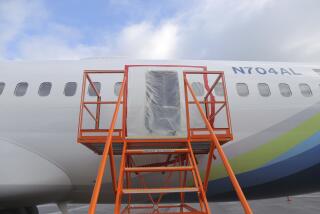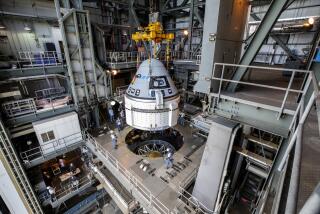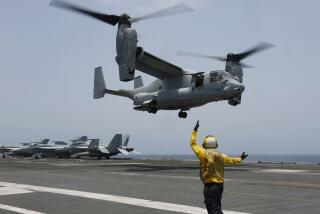AF Admits Trouble With Turbine Blades
WASHINGTON — Two generals contradicted earlier Air Force denials and told a House subcommittee Friday that repaired turbine blades had failed in the engines of F-15 and F-16 fighter planes.
But Brig. Gen. Henry Viccellio, vice commander of the Air Logistics Center at Kelly Air Force Base in San Antonio, told the House Energy and Commerce investigations subcommittee that an earlier Air Force statement had been a mistake, not an effort to mislead.
And representatives of engine manufacturer Pratt & Whitney told the subcommittee that there was no evidence that the blade failures resulted from repairs.
They testified at a hearing into whether the Air Force mishandled the repair of turbine blades for the engines that power the F-15 and F-16 planes.
“The story to be told at today’s hearing is one of threatened pilot safety, potential loss of high-performance fighter aircraft, waste, collapse of quality control, possible fraud, cover-up and the issuing of false and misleading statements by the Air Force and a major defense contractor--Pratt & Whitney,” subcommittee Chairman John D. Dingell (D-Mich.) said at the opening of the hearing.
Letter to Dingell
In a letter to Dingell on July 30, the Air Force said it had no evidence that engine failures had resulted from repaired blades.
But Brig. Gen. Michael C. Kerby wrote to Dingell Thursday, saying that three failures had occurred in repaired turbine blades on twin-engine F-15s. In all cases, the aircraft landed safely.
Viccellio said the Air Force had issued its erroneous statement before researching all engine failure reports. “We did not do our homework,” he said.
“We made an error,” said Gen. Earl T. O’Loughlin, commander of the Air Force Logistics Command.
Reps. Ron Wyden (D-Ore.) and John Bryant (D-Tex.) accused Pratt & Whitney of trying to hide the fact that repaired turbine blades had been involved in engine failures.
Ed Ford, company vice president in charge of the engine program, denied the allegations. He said the company knew that repaired blades had failed but reiterated company statements that the failures were due not to the repairs but to other factors that could affect new blades also.
Dingell said he began the inquiry after investigators from the General Accounting Office found an employee of Chromalloy-American Corp. rummaging through a scrap bin at Kelly Air Force Base looking for repairable turbine blades.
More to Read
Inside the business of entertainment
The Wide Shot brings you news, analysis and insights on everything from streaming wars to production — and what it all means for the future.
You may occasionally receive promotional content from the Los Angeles Times.










